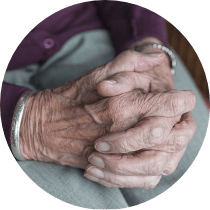

Exercise for the elderly is imperative to maintaining health, strength and a will to live self-sufficiently.
Our Biokineticists will go very slowly and cautiously, as well as explain and demonstrate each test to the patient.

At imude, our Biokineticists provide supervised care for our elderly population to meet their training needs.
Elderly rehab
At iMude, our Biokineticists provide supervised care for our elderly population to meet their training and everyday needs. Exercise for the elderly is imperative to maintaining health, strength and a will to live self-sufficiently and with confidence. Professional rehabilitation is often needed after a loved one has had a bad fall. They may also have been in a car accident, fallen ill, suffered a cardiac event or had surgery.
Benefits from our programmes: Improved balance, walking, motor coordination, strength and mobility.
Our older population feel less stiff, more mobile, healthy and cared for.
Elderly rehab at iMude
Supervised Care
At iMude, our Biokineticists provide supervised care for our elderly population to meet their training needs. Professional rehabilitation is often needed after a loved one has had a bad fall, car accident, fallen ill, suffered a cardiac event or had surgery. Our rehabilitation programmes focus on helping the patient regain balance, improved walking, motor coordination, strength and mobility. In essence – we help them to feel looser, more active and cared for.
Risk Assessments
Our assessments consist of various risk stratification questionnaires and basic functional testing. A test like this would comprise of 5 minutes paper work (completing questionnaires – with the help of the Receptionist/Biokineticists), basic tests like BP and heart rate, posture, functional testing and walking assessment. The full test will take about 30 – 35 minutes. The Biokineticist will go very slowly and cautiously, as well as explain and demonstrate each test to the patient.
Information Gathering
The information gathered helps us to determine what exercises routine will suit the person best. All the tests and information are done to eliminate risks, incorrect exercises, incorrect exercise intensities and allow the patient to experience a nice training environment.
Specialized Testing
We also offer specialized testing. Possible tests include spirometer and oxygen tests, cholesterol and blood glucose test and body fat percentage distribution throughout your body.
Rehabilitation Programmes
These tests give us invaluable information that greatly reduce risk and guide rehabilitation programmes.
Our facility offers our patients equipment that can accommodate our clients’ needs – for example, our cardio equipment has low resistance settings so that our clients can use them. Weights and resistance bands vary from the very light and easy to more challenging resistances
It is worthwhile mentioning that we CANNOT diagnose and merely use the results for feedback and monitoring of your progress.
Our assessments consist of various risk stratification questionnaires and basic functional testing. A test like this would comprise of 5 minutes paper work (completing questionnaires – with the help of the receptionist/Biokineticists).
Basic tests included are, blood pressure and heart rate, posture, functional, strength testing and a walking assessment.
The full test will take about 30 – 45 minutes. The Biokineticist will (if need be) go slowly and cautiously, explaining and demonstrating each test to the patient
The information gathered helps us to determine the best exercise regime for the patient. All the tests and information collected help eliminate risk, as well as incorrect exercise type and intensity per individual.
Our facility offers age appropriate equipment that can accommodate our clients’ needs – for example, our cardio equipment has low resistance settings, suitable for the less active. Weights and resistance bands vary from very light/easy to more challenging resistances.
